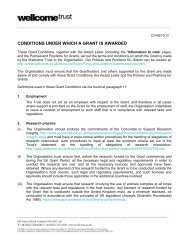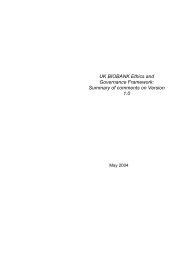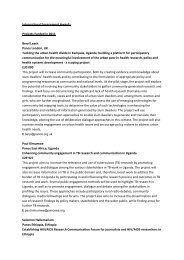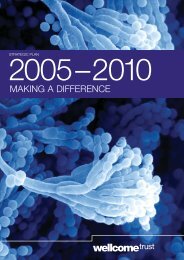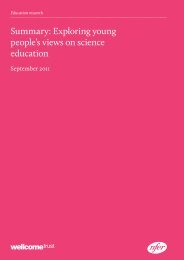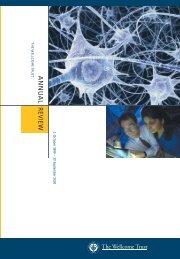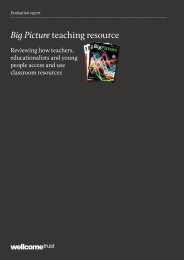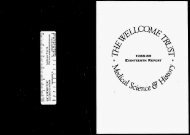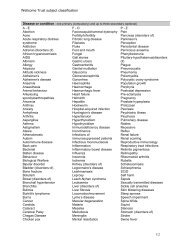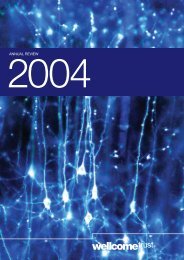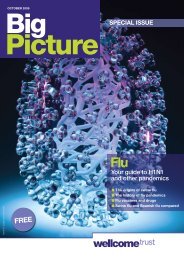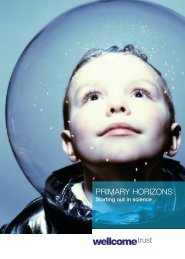Create successful ePaper yourself
Turn your PDF publications into a flip-book with our unique Google optimized e-Paper software.
48 | TECHNOLOGY TRANSFER<br />
TECHNOLOGY TRANSFER<br />
Technology Transfer at the <strong>Wellcome</strong> <strong>Trust</strong> seeks to maximise the impact of research<br />
innovations on health by facilitating their development to a point at which they can be<br />
further developed by the market.<br />
Development work on vaccines for pandemic flu, tuberculosis and<br />
leishmaniasis was supported this year, alongside innovative research on<br />
biocompatible materials for cartilage repair and production of blood<br />
substitutes from human stem cells. In addition, a £45 million initiative in<br />
medical engineering was launched to drive forward the development of<br />
new products.<br />
Translation Awards support a diverse<br />
array of technologies, covering the<br />
physical sciences and mathematics as<br />
well as biology; they are available to both<br />
academic institutions and early-stage<br />
companies. Of 43 full applications<br />
received during 2007/08, 37 per cent<br />
were successful. The mean value of<br />
awards was £608 000 (range £25 000–<br />
1.6m) and the average duration was 30<br />
months (range 9–42 months). Funding<br />
decisions are generally made within three<br />
to four months.<br />
Projects funded address a wide range of<br />
potential applications, including<br />
therapeutics, vaccines, diagnostics,<br />
medical devices and enabling<br />
technologies.<br />
CellMedica Ltd received funding to<br />
develop a virus-specific T-cell therapy for<br />
immunosuppressed patients. In surgery,<br />
an award to Orthox Ltd is supporting<br />
work on a novel approach for repair of<br />
cartilage tears within knee joints using a<br />
bioresorbable, load-bearing cartilage<br />
implant, while Morgan Alexander and<br />
colleagues at the University of<br />
Nottingham are using high-throughput<br />
microarrays to identify polymers resistant<br />
to bacterial colonisation, to prevent<br />
biofilm formation.<br />
In veterinary medicine, Andrew Waller<br />
and colleagues at the Animal Health <strong>Trust</strong><br />
were awarded funding to develop a<br />
point-of-care test for horses infected with<br />
Streptococcus equi (the cause of<br />
‘strangles’).<br />
Several awards reflected the needs of<br />
developing countries. Paul Kaye and<br />
colleagues at the University of York, for<br />
example, are developing a therapeutic<br />
T-cell-based vaccine for human visceral<br />
leishmaniasis, while Cambridge<br />
Optronics Ltd is working on a low-cost<br />
compact microscope for routine<br />
diagnostic use in resource-poor settings.<br />
Strategic Translation Awards are<br />
designed to support translational<br />
research in areas of key importance to<br />
the <strong>Wellcome</strong> <strong>Trust</strong>. Twenty-two<br />
applications have been considered to<br />
date (mean value £3.3m, range<br />
£1m–8.6m), in diagnostics, vaccines,<br />
regenerative medicine, genotyping<br />
technology, medical engineering and<br />
drug discovery.<br />
Seven new projects in academic<br />
institutions and companies were taken<br />
forward this year. These included<br />
research on vaccines against<br />
tuberculosis (Helen McShane, University<br />
of Oxford) and pandemic influenza (Dan<br />
Henderson, PaxVax, Inc.), as well as<br />
antiviral drugs for dengue fever (Alex<br />
Matter, Novartis Institute for Tropical<br />
Diseases). Mike Stratton and Andy<br />
Futreal, leaders of the Cancer Genome<br />
Project at the <strong>Wellcome</strong> <strong>Trust</strong> Sanger<br />
Institute, are working with colleagues in<br />
the USA on high-throughput screening<br />
and genotyping techniques to identify<br />
drug-sensitising genotypes in human<br />
cancer cells.<br />
Other notable awards covered the<br />
possible use of human embryonic stem<br />
cells to generate red blood cell<br />
concentrates for blood transfusion and<br />
an innovative bacteriophage-based<br />
approach to treat Staphylococcus<br />
aureus and MRSA.<br />
The £91m Seeding Drug Discovery<br />
initiative, launched in 2005, has so far<br />
made 17 awards over four rounds of<br />
funding (mean value £3m; range<br />
£1.3m–5.0m). In 2007/08, seven awards<br />
were made for drug discovery programmes<br />
in therapeutic areas spanning sepsis,<br />
malaria, bacterial infections, cardiovascular<br />
disease and degenerative central<br />
nervous system disorders.<br />
During the year, a new £45m initiative in<br />
medical engineering was launched in<br />
partnership with the Engineering and<br />
Physical Sciences Research Council. It<br />
aims to support the development of<br />
centres of excellence integrating<br />
medicine with the physical sciences,<br />
mathematics and engineering to foster a<br />
culture of innovation and product<br />
development in areas of unmet medical<br />
need. Final funding decisions will be<br />
made in 2008/09.<br />
Several companies that received support<br />
through Translation Awards for validation<br />
of their technologies have had success in<br />
raising further funds, including the start-up<br />
companies Population Genetics<br />
Technologies Ltd, Aircraft Medical Ltd,<br />
Achaogen, Inc. and CardioDigital Ltd.<br />
Overall, companies and projects funded<br />
through Technology Transfer have raised<br />
over £273m in third-party support to date.



